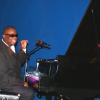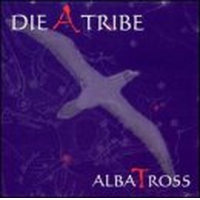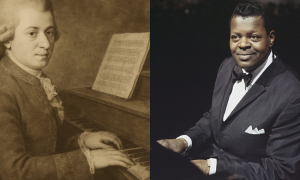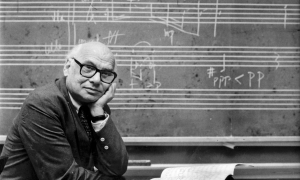Home » Jazz Articles » Opinion » Can You Judge an Album By Its Label?
Can You Judge an Album By Its Label?
For almost as long as there have been record labels, many labels have sought to build a reputation or a brand identity for themselves in terms of the genre of music presented on their labels or the technical quality of their product. Some of the largest and longest-running labels, such as Columbia, RCA, and Warner Brothers, have taken a "big tent" approach in which major artists across the musical spectrum have all appeared on the same label; so while consumers could not know for sure what type of music would be contained on an album on one of these labels, they could at least know that the performer and the performance was deemed to be of sufficient quality and market appeal that the album could be reasonably expected to sell well. While the majors can be accused of making their artist roster decisions based more on the bottom line than on the preservation and advancement of the art form, they also have the established distribution channels and the promotional resources to improve the chances of an album's success.
Smaller independent labels are much more likely to cater to a narrower bandwidth of musical tastes. These labels are often started by producers, jazz-loving record execs or other business people, or even the artists themselves. Sometimes they retain their independent status, and in other cases they are either bought by one of the major record conglomerates or they sign distribution deals with one of the majors. Some large and medium size labels spin off sub-labels to differentiate the various genres in their catalogs, providing the consumer with a clearer idea of what to expect.
Since this column focuses mainly on contemporary jazz (and I wish to keep it to a managable, readable length), I'll highlight some of the more notable past and present contemporary jazz labels. I'm sure I'll leave many fine labels out, but these few have consistently put out good-quality CDs, and I have been known to buy a new artist solely by the endorsement of being on one of these labels. I've been rarely disappointed.
CTI Records
One of the most remarkable labels in contemporary jazz history was producer Creed Taylor's CTI Records. Creed Taylor was already a well-established producer, having produced many fine recordings throughout the sixties for Verve and A&M. CTI's heyday was the early to mid seventies, and the label was innovative and revolutionary in numerous ways. Taylor created albums with a mostly tasteful blend of traditional jazz structures and more pop-accessible arrangements. The albums were packaged in double gatefold jackets (instead of a single cardboard sleeve, there was a second sheet of cardboard hinged on the left, so the album jacket opened like a book) with glossy, artsy abstract photography, creating a classy, extravagant look. Best of all were the artists on the roster, who often played on each others' albums:
Hubert Laws
woodwindsb.1939

George Benson
guitarb.1943

Grover Washington, Jr.
saxophone1943 - 1999

Bob James
pianob.1939

Freddie Hubbard
trumpet1938 - 2008

Stanley Turrentine
saxophone, tenor1934 - 2000

Joe Farrell
saxophone1937 - 1986
 "
data-original-title="" title="">Deodato, and
"
data-original-title="" title="">Deodato, and 
Airto Moreira
percussionb.1941
GRP Records
GRP (originally standing for Grusin/Rosen Productions) enjoyed a similar reputation as the premiere contemporary jazz label throughout the eighties and the first half of the nineties. Formed by keyboardist/composer/arranger/producer
Dave Grusin
pianob.1934

Lee Ritenour
guitarb.1952

Gary Burton
vibraphoneb.1943

Tom Scott
saxophone, tenorb.1948

Chick Corea
piano1941 - 2021

Diane Schuur
vocalsb.1953

Kevin Eubanks
guitarb.1957

Nelson Rangell
saxophoneb.1960

David Benoit
pianob.1953
DMP
Another label which has developed a reputation as a technology leader in superior audio quality (thanks to their total commitment to the digital medium in the early eighties as well as superior microphone technology and placement) is DMP, or Digital Music Products. The music made by the artists on the label was consistently high quality as well, but DMP has never had much success making it onto the airwaves. Most of it is too contemporary for traditionalists, and not "smooth" enough for the lite jazz stations. Two of their most prolific artists are Flim and the BB's (one of my very favorite bands, with a quirky personality all their own) and the PPBob Mintzer}} Big Band, one of the foremost modern big bands playing today. Guitarists
Thom Rotella
guitar
Chuck Loeb
guitar1955 - 2017

Joe Beck
guitar1945 - 2008

Warren Bernhardt
pianob.1938

Manfredo Fest
keyboards1936 - 1999

Andy LaVerne
pianob.1947
Concord Jazz
Concord Jazz was founded by Carl Jefferson in the early eighties as an offshoot to the Concord (CA) Jazz Festival. It quickly developed as a haven for west coast cool/traditional jazz, usually in small combo format. Most of the roster was high-calibre talent, but there were only a few household names, such as
Mel Torme
vocals1925 - 1999

Rosemary Clooney
vocals1928 - 2002

Marian McPartland
piano1918 - 2013

Rob McConnell
trombone1935 - 2010

Maynard Ferguson
trumpet1928 - 2006
Heads Up
Heads Up boasts some fine developing talent, such as harpist " data-original-title="" title="">Roberto Perera, pianist "
data-original-title="" title="">Joe McBride, saxophonist
"
data-original-title="" title="">Joe McBride, saxophonist  "
data-original-title="" title="">Kenny Blake, and bassist
"
data-original-title="" title="">Kenny Blake, and bassist 
Gerald Veasley
band / ensemble / orchestrab.1955

Andy Narell
drums, steelb.1954

Paquito D'Rivera
clarinetb.1948

Richie Cole
saxophone, alto1948 - 2020
N2K Encoded Music
N2K Encoded Music is similarly embracing the multi-media approach. This label is the combined forces of Larry Rosen (formerly of GRP) and legendary producer Phil Ramone, who has impressive credits in both the jazz and rock worlds. The label has already attracted Dave Grusin (no surprise),
Arturo Sandoval
trumpetb.1949

Jonathan Butler
guitarb.1961
Telarc Music
Like DMP, Telarc has earned a reputation for maximizing the capabilities of digital technology to produce sonically outstanding recordings which also happen to be high quality music. While originally founded as a classical label, Telarc created the sub-label Telarc Jazz, which features some of jazz's master talents such as
Oscar Peterson
piano1925 - 2007

Ray Brown
bass, acoustic1926 - 2002

Joe Pass
guitar1929 - 1994

George Shearing
piano1919 - 2011

Dave Brubeck
piano1920 - 2012
Zebra Music
Zebra Records, after a stint as a subsidiary of MCA in the late eighties, was reformed a couple years ago, and has released a remarkably consistent line of contemporary jazz CDs by the likes of bassist
Brian Bromberg
bassb.1960

Jeff Lorber
keyboardsb.1952

Joe Zawinul
keyboards1932 - 2007

Rob Mullins
pianob.1958

Jazz Is Dead
band / ensemble / orchestraTags
Opinion
Dave Hughes
Hubert Laws
george benson
Grover Washington, Jr.
Bob James
Freddie Hubbard
Stanley Turrentine
Joe Farrell
Deodato
Airto
Dave Grusin
Lee Ritenour
Gary Burton
Tom Scott
Chick Corea
Diane Schuur
Kevin Eubanks
Nelson Rangell
David Benoit
Flim and the BBs
Thom Rotella
Chuck Loeb
Joe Beck
Warren Bernhardt
Manfredo Fest
Andy LaVerne
Mel Torme
Rosemary Clooney
Marian McPartland
Rob McConnell
Maynard Ferguson
Roberto Perera
Joe McBride
Kenny Blake
Gerald Veasley
Andy Narell
Paquito D'Rivera
Richie Cole
arturo sandoval
Jonathan Butler
oscar peterson
Ray Brown
Joe Pass
George Shearing
Dave Brubeck
Brian Bromberg
Jeff Lorber
Joe Zawinul
Rob Mullins
Jazz is Dead
Comments
PREVIOUS / NEXT
Support All About Jazz
 All About Jazz has been a pillar of jazz since 1995, championing it as an art form and, more importantly, supporting the musicians who make it. Our enduring commitment has made "AAJ" one of the most culturally important websites of its kind, read by hundreds of thousands of fans, musicians and industry figures every month.
All About Jazz has been a pillar of jazz since 1995, championing it as an art form and, more importantly, supporting the musicians who make it. Our enduring commitment has made "AAJ" one of the most culturally important websites of its kind, read by hundreds of thousands of fans, musicians and industry figures every month.





 Buy Now
Buy Now






















